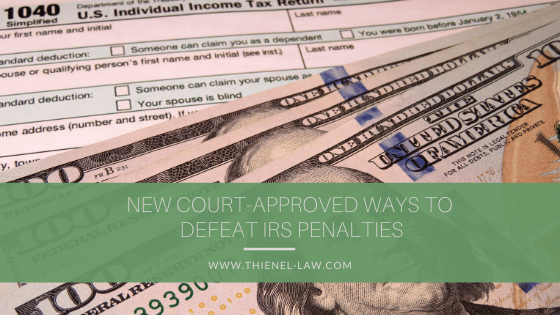New Court-Approved Ways to Defeat IRS Penalties
Are you fighting to defeat IRS penalties? If so, new court-approved ways to defeat IRS penalties can help you keep the money you earned instead of paying it to the federal government. As a Maryland tax attorney, I continually monitor changes in the tax code that benefit my clients and help devise strategies to avoid penalties and decrease overall tax liability.
A Little-Known Administrative Requirement Related to Some Penalties
According to 26 U.S. Code §6751(b), a penalty cannot be assessed unless the immediate supervisor of the person assessing a penalty (or a higher-level official designated by the Secretary of the Treasury) approves the assessment in writing. Why is this code section important?
A recent court ruling by the Second Circuit Court of Appeals reversed a prior decision by the Tax Court in a different case on this very issue. The Tax Court had ruled that it could not determine if §6751(b) applied because the penalty had not been assessed yet.
The Second Circuit Court of Appeals ruled in another case that the IRS failed to show that the required written approval by a supervisor, as required by the code section, before a notice of deficiency was issued prevented the IRS from assessing the penalty. Then the Tax Court agreed and held that the IRS must produce evidence of compliance with the administrative requirements under §6751(b) when it claims penalties are owed in a deficiency proceeding.
Does the Administrative Requirement Apply to All Tax Penalties?
No, the provision does not apply to penalties related to late-filing or late payments for individuals and C Corps. It also does not apply to penalties related to estimated tax payments for individuals and C Corps. Penalties automatically calculated through electronic means are not subject to the administrative requirement. FBAR penalties assessed under Title 31 of the United States Code are not subject to §6751(b) because the section only applies to penalties under the Internal Revenue Code.
“The IRS must produce evidence of compliance with the administrative requirements under §6751(b) when it claims penalties are owed in a deficiency proceeding.”
— Steve Thienel
Examples of some penalties that fall within the scope of §6751(b) include:
· Tax return preparer penalties
· Accuracy-related penalties
· Late-filing penalties for S Corps and partnerships
· Information return penalties
· Civil fraud penalties
· Trust fund recovery penalties
· Daily delinquency penalties
· Valuation penalties
Did the IRS Incorrectly Assess Your Penalty?
If you believe that the IRS failed to follow the administrative requirements under §6751(b), the first step is to determine whether a written authorization exists in your IRS file. This step can be accomplished by filing a Freedom of Information Act (FOIA) request with the IRS asking for a copy of the document.
If you are fighting a tax penalty on other grounds, you can raise §6751 (b) compliance as a secondary reason for the abatement. Raising the issues forces the IRS to produce the written authorization showing it complied with the requirements under §6751(b). For example, if you are fighting a proposed lien or levy, you could raise the issue while challenging the lien or levy in the IRS Appeals Office. You could also raise the issue at a Collection Due Process Hearing or in cases heard by the United States Tax Court. An experienced tax attorney can examine your situation to determine the best way to use §6751(b) to fight a tax penalty.
Contact a Maryland Tax Attorney for More Information
Being assessed a tax penalty does not necessarily mean you owe the penalty. There could be several ways to fight and defeat IRS penalties. Contact Thienel Law today. Maryland business attorney Steve Thienel is dedicated to assisting clients in Maryland, Virginia, and throughout the DC Metro area.


